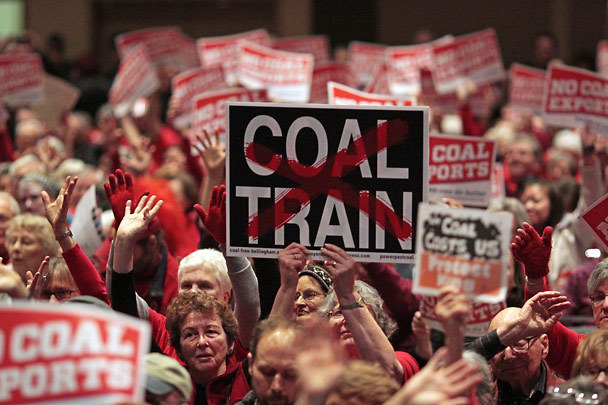By Thomas Linzey / CELDF
Four years ago, as we were leaving Spokane to help rural Pennsylvania communities stop frack injection wells and gas pipelines, this region’s environmental groups couldn’t stop talking about “stopping the coal trains.”
After people in British Columbia – including NASA’s top climate scientist James Hansen – were arrested for blocking oil trains; and after people in Columbia County, Oregon have now proposed a countywide ban on new fossil fuel trains, one would think that both the Spokane City Council and the region’s environmental groups would have begun to take strong steps here to, well, actually stop the coal trains.
After all, there is now almost universal agreement that the continued use of fossil fuels threatens almost every aspect of our lives – from scorching the climate to acidifying the oceans and fomenting widespread droughts.
But it seems that both the Council and this region’s environmental groups have resigned themselves to being silent accomplices to this slow-moving disaster.
A few weeks ago, at a forum on coal and oil trains, rather than propose a citywide ban on oil and coal trains, those groups instead focused on the dangers of train derailments and coal dust – two real issues to be sure – but ones that fall completely short of recognizing the underlying problems posed by the trains.
If the problem is derailments and dust, then the solution is to reinforce and cover the railroad cars. That may or may not happen, but even if it does, it doesn’t solve the fundamental problem posed by the coal and oil trains. Instead, such a stance broadcasts the message from the City of Spokane and this region’s environmental groups that the coal and oil trains are okay as long as they are “safe.”
The real problem, of course, is that the fossil fuels that the oil and coal trains carry – when used the way they are intended to be used – can never be made “safe” because their guaranteed combustion is slowly boiling the very planet on which we live.
At the end of Spokane City Council President Ben Stuckart’s presentation at the forum last week, he spoke about his dead-end meetings with state and federal officials, whose doors were open to the energy and railroad corporations but not to communities affected by the trains. Stuckart declared that he wasn’t sure that anything short of laying down on the tracks would stop the coal and oil trains.
For one brief shining moment, it seemed that the heavens had parted and what we’re really up against – a governmental system controlled by the very corporations it is ostensibly supposed to regulate – came shining through.
As I watched, people across the room began to shout and applaud; and then, just as quickly as it had come, it passed, as the hosts of the forum steered everyone back to their latest moving target – this time, urging people to write letters begging Governor Inslee to stop proposed oil and gas exports. In other words, now nicely asking the Governor to stop more oil and coal trains from invading Spokane.
I then realized why I stopped going to those gatherings – I stopped because the form of activism proposed by the groups actually strips us of the belief that we’re capable of doing anything by ourselves, as a community, to actually stop the trains. Writing letters reinforces a hopelessness of sorts – that we’re completely dependent on the decision by others to “save” us, and that we’re incapable of taking action to save ourselves.
It would be akin to the civil rights movement writing letters to congress instead of occupying the lunch counter or the seats at the front of the bus. Or Sam Adams sending a letter to King George urging him to put safety bumpers on the ships carrying tea, rather than having a tea party by dumping casks of tea in the harbor.
Until we confront the energy and railroad corporations directly, they will continue to treat Spokane as a cheap hotel. We need to ban and stop the trains now – using everything that we can – before future generations wonder why we spent so much time sending letters and so little time protecting them.
Thomas Alan Linzey, Esq., is the Executive Director of the Community Environmental Legal Defense Fund and a resident of the City of Spokane. The Legal Defense Fund has assisted over two hundred communities across the country, including the City of Pittsburgh, to adopt local laws stopping corporate factory farms, waste dumping, corporate water withdrawals, fracking, and gas pipelines. He is a cum laude graduate of Widener Law School and a three-time recipient of the law school’s public interest law award. He has been a finalist for the Ford Foundation’s Leadership for a Changing World Award, and is a recipient of the Pennsylvania Farmers Union’s Golden Triangle Legislative Award. He is admitted to practice in the United States Supreme Court, the Third, Fourth, Eighth, and Tenth Circuit Courts of Appeals, the U.S. District Court for the Western and Middle Districts of Pennsylvania, and the Commonwealth of Pennsylvania. Linzey was featured in Leonardo DiCaprio’s film 11th Hour, assisted the Ecuadorian constitutional assembly in 2008 to adopt the world’s first constitution recognizing the independently enforceable rights of ecosystems, and is a frequent lecturer at conferences across the country. His work has been featured in the New York Times, the Los Angeles Times, Mother Jones, the Nation magazine, and he was named, in 2007, as one of Forbes’ magazines’ “Top Ten Revolutionaries.” He can be reached at tal@pa.net.

